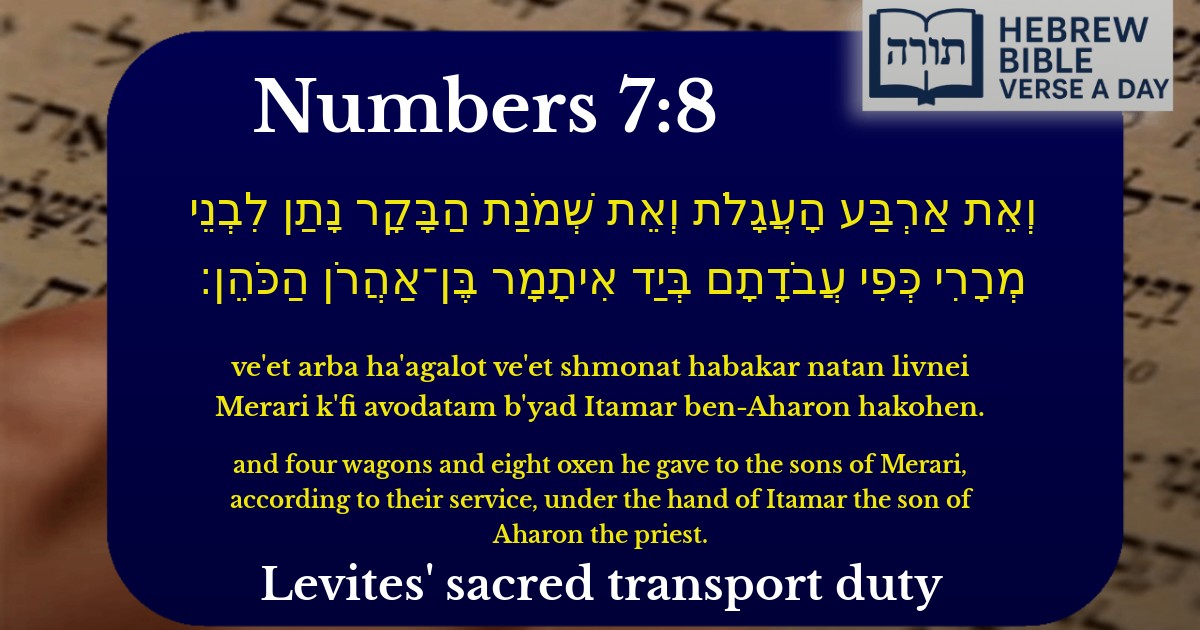Join Our Newsletter To Be Informed When New Videos Are Posted
Join the thousands of fellow Studends who rely on our videos to learn how to read the bible in Hebrew for free!
Hebrew Text
וְאֵת אַרְבַּע הָעֲגָלֹת וְאֵת שְׁמֹנַת הַבָּקָר נָתַן לִבְנֵי מְרָרִי כְּפִי עֲבֹדָתָם בְּיַד אִיתָמָר בֶּן־אַהֲרֹן הַכֹּהֵן׃
English Translation
and four wagons and eight oxen he gave to the sons of Merari, according to their service, under the hand of Itamar the son of Aharon the priest.
Transliteration
Ve'et arba ha'agalot ve'et shmonat habakar natan livnei Merari k'fi avodatam b'yad Itamar ben-Aharon hakohen.
Hebrew Leining Text
וְאֵ֣ת <b>׀</b> אַרְבַּ֣ע הָעֲגָלֹ֗ת וְאֵת֙ שְׁמֹנַ֣ת הַבָּקָ֔ר נָתַ֖ן לִבְנֵ֣י מְרָרִ֑י כְּפִי֙ עֲבֹ֣דָתָ֔ם בְּיַד֙ אִֽיתָמָ֔ר בֶּֽן־אַהֲרֹ֖ן הַכֹּהֵֽן׃
וְאֵ֣ת ׀ אַרְבַּ֣ע הָעֲגָלֹ֗ת וְאֵת֙ שְׁמֹנַ֣ת הַבָּקָ֔ר נָתַ֖ן לִבְנֵ֣י מְרָרִ֑י כְּפִי֙ עֲבֹ֣דָתָ֔ם בְּיַד֙ אִֽיתָמָ֔ר בֶּֽן־אַהֲרֹ֖ן הַכֹּהֵֽן׃
🎵 Listen to leining
Parasha Commentary
📚 Talmud Citations
This verse is not quoted in the Talmud.


Context of the Verse
The verse (Bamidbar 7:8) describes the distribution of wagons and oxen to the Levite families for transporting the Mishkan (Tabernacle) during the Israelites' travels in the wilderness. The sons of Merari received four wagons and eight oxen, as their duties involved carrying the heavier structural components of the Mishkan.
Rashi's Explanation
Rashi (Bamidbar 7:8) clarifies that the distribution was proportionate to the workload of each Levite family. The sons of Gershon, who carried lighter materials (curtains and coverings), received only two wagons (as mentioned in the previous verse), while the sons of Merari, who transported the heavy beams, sockets, and pillars, required more wagons. This demonstrates the principle of equitable distribution based on need.
Role of Itamar
The verse emphasizes that the distribution was supervised by Itamar, Aharon's youngest son. The Ramban (Bamidbar 7:8) notes that Itamar was entrusted with overseeing the Levites' transport duties, as he was known for his meticulousness in handling sacred matters. The Talmud (Yoma 47a) also highlights Itamar's righteousness, making him a fitting supervisor for this task.
Symbolism of the Numbers
Practical Lessons
The Sforno (Bamidbar 7:8) derives a lesson in communal responsibility: resources must be allocated wisely to ensure that those with greater burdens receive adequate support. This principle applies to both physical and spiritual responsibilities within the Jewish community.